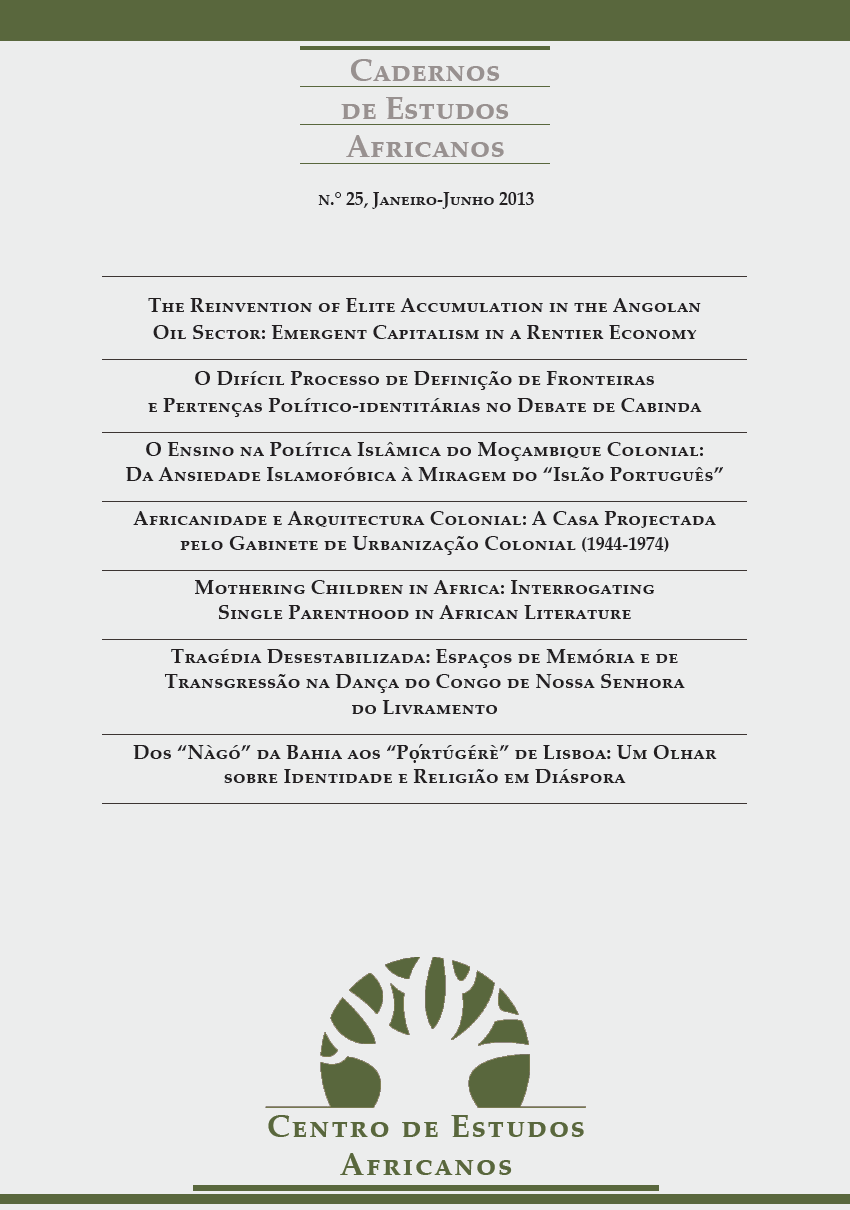Mothering Children in Africa: Interrogating single parenthood in African literature
DOI:
https://doi.org/10.4000/cea.880Palavras-chave:
feminism, single parenthood, African literature, womanhood, widowhoodResumo
The issue of motherhood in African women’s writings has transcended the façade of binary oppositions created by radical “Western” feminists who pitch women against men in their campaign for gender equality or, worse still, belittle or show disdain for the men-folk. The approach of African women writers takes issue with the collapse of social inequalities and its potentially disastrous implications. This essay examines the representations of African women in their struggle against the divisive impact of single parenthood in the present economic crisis and their lack of power to cope with the challenges that this crisis poses. By means of a critical and evaluative textual analysis, the essay looks at how contemporary fictional writing succeeds in representing this diffuse social reality.Referências
Adebayo, A. (1996). The African mother: Her changing perceptions in West African fiction. In Adebayo, A. (Ed.), Feminism and black women’s creative writing: Theory, practice, and criticism (pp. 178-193). Ibadan: AMD.
Adelugba, D. (2007). Foreword. In Binebai, B., Beyond nightmare. Ibadan: Kraft Books.
Adesanmi, P. (1996). The fire this time: Discourse of the body and “scrotophobia” in the works of Calixthe Beyala. In Adebayo, A. (Ed.), Feminism and black women’s creative writing: Theory, practice, and criticism (pp. 201-219). Ibadan: AMD.
Ba, M. (1981). So long a letter (M. Bode-Thomas, Trad.). Ibadan: New Horn Press (Obra original publicada em 1980).
Binebai, B. (2008). Beyond nightmare. Ibadan: Kraft Books.
Bungaro, M. (2006). Mothering daughters and the other side of the story in Amma Darko, Ama Ata Aidoo and Nozipo Maraire. In Emenyonu, E. N. (Ed.), New directions in African literature. Special issue of African Literature Today, 25, pp. 67-81.
Chukukere, C. G. (1995). Gender voices and choices: Redefining women in contemporary African fiction. Enugu: Fourth Dimension.
Chukwuma, H. (2000). The face of Eve: Feminist writing in African literature. In Opata, D. U., & Ohaegbu, A.U. (Eds.), Major themes in African literature (pp. 101-114). Nsukka: AP Express.
Curry, G. (2008). African women, tradition and change in Cheikh Hamidou Kane’s Ambiguous Adventure and Mariama Ba’s So Long a Letter. Journal of Pan African Studies, 2 (5), 111-129.
Darko, A. (1998). The Housemaid. Portsmouth: Heinemann.
Evwierhoma, M. I. E. (2007). Scripting women into the mainstream?: The women of tomorrow in “The angel” and “The sisters”. In Adeoti, G. (Ed.), Muse and mimesis critical: Perspectives on Ahmed Yerima’s Drama (pp. 313-320). Ibadan: Spectrum Books.
Grimshaw, J. (1986). Feminist philosophers: Women’s perspectives on philosophical traditions. Hemel Hempstead: Harvester Wheatsheaf.
Holla, P. (1997). Post-colonial residue. In http://www.postcolonialweb.org/poldiscourse/holla4.html// (accessed February 15, 2013).
Ibitokun, B. M. (1995). African drama and the Yoruba worldview. Ibadan University Press.
Jeremiah, E. (2006). Motherhood to mothering and beyond: Maternity in recent feminist thought. Journal of the Association for Research on Mothering, 8 (1-2), 21-33.
Kolawole, M .E. M. (2000). Feminine preoccupations in African literature: A theoretical appraisal. In Opata, D. U., & Ohaegbu, A.U. (Eds.), Major themes in African literature (pp. 115-130). Nsukka: AP Express.
Littlefield, M. B. (2007). Black women, mothering, and protest in 19th century American society. The Journal of Pan African Studies, 2 (1), 53-61.
Nnaemeka, O. (Ed.) (1997). The politics of (m)othering: Womanhood, identity, and resistance in African literature. London & New York: Routledge.
Nwakaeze-Ogugua, I. (2007). Feminism and African cultural heritage. Gender and behaviour, 5 (1), 1022-1041.
Ojo-Ade, F. (1982). “Still a victim?” Mariama Ba’s Une si longue lettre. In Jones, E. D. (Ed.), African Literature Today, 12, pp. 71-87. London: Heinemann Educational Books.
Olapegba, P. O., & Chovwen, C. O. (2006). Impact of widowhood cultural practical and locus of control on perceived social support of widows in Anambra Nigeria. Gender and Behaviour, 4 (2), 836-842.
Onyewadume, F. (2001). Echoes of hard times and other plays. Ibadan: Heinemann Educational Books (Nigeria) PLC.
Opara, C. (1996). The emergence of the female self: The liberating pen in Mariama Ba’s Une si longue lettre and Sembene Ousmane’s Lettres de France. In Adebayo, A. (Ed.), Feminism and black women’s creative writing: Theory, practice and criticism (pp. 153-167). Ibadan: AMD.
Oyewole, T. O., & Olowonmi, A. (2011). Gender ideology and transformative education: Rethinking women empowerment in post-colonial Nigeria. New Trends in Linguistics and Literary Studies, 1 (1), 138-153.
Uko, I. I. (2006). Transcending the margins: New directions in women’s writings. In Emenyonu, E. N. (Ed.), New Directions in African Literature. Special issue of African Literature Today, 25, pp. 82-93.
Downloads
Publicado
Edição
Secção
Licença
Direitos de Autor (c) 2016 Cadernos de Estudos Africanos

Este trabalho encontra-se publicado com a Licença Internacional Creative Commons Atribuição-NãoComercial-CompartilhaIgual 4.0.
Autorizo a publicação do artigo/recensão submetido do qual sou autor.
Declaro ainda que o presente artigo é original, que não foi objecto de qualquer tipo de publicação, e cedo em exclusivo os direitos de publicação à revista Cadernos de Estudos Africanos. A reprodução do artigo, no todo ou em parte, noutras publicações ou noutros suportes depende de autorização prévia da editora Centro de Estudos Internacionais do Iscte - Instituto Universitário de Lisboa.

